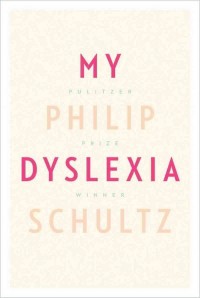My Dyslexia: Review of Philip Schultz’s memoir

By Kathy Kuhl
Book Review: Philip Schultz’s My Dyslexia
In 2008, at age 63, after a long career writing, Philip Schultz won a Pulitzer prize for Failure, a volume of poetry.

Four years before, when one of his sons was diagnosed with dyslexia, Philip realized he was dyslexic, too. After a lifetime of struggles with written and spoken languages, and a hard-earned career as a writer and writing teacher, he now begin to understand his struggle differently. Philip Schultz’s memoir, My Dyslexia, is a highly personal story of success, despite a continuing, wrenching struggle.
If you have a child with a language-based learning disability, here’s why you should consider reading this book:
- Schultz’s book, more than any I’ve read, conveys how it feels to have a learning disability: his sense of stupidity, failure, and hopelessness. Schultz recalls being dismissed to “the dummy table” of his classroom and ignored, unworthy of any attention. He ate alone daily. He failed third grade. In a poor inner-city neighborhood, with a violent father, Schultz was harassed by his classmates and often fought back. He was kicked out of school for fighting.
Even his reading tutor was discouraging:
And one day out of frustration [my reading tutor] asked me what I thought I was going to do in life if I couldn’t read. And surprising both of us, I said I wanted to be a writer.… And he couldn’t stop laughing…”
Schultz explains how these struggles continue, and describes his current strategies to cope.
- Schultz’s story, despite its heartbreaking setbacks, is finally a success story. Schultz eventually teaches himself to read, though laboriously. He gets through college. He has several published books. He also runs the graduate writing program at New York University.
His Russian immigrant family had a rich storytelling tradition, which fed his longing to write. He began crafting stories as a child. He recalls his mother and grandmother enjoying his tales, rare proof that he had some skill.
- Schultz believes that battling language makes people better at solving problems. He explains his labyrinthine methods of getting himself to write and read. He quotes 16-year-old Melissa Rey, winner of the Discover 3M Young Scientist Challenge, who said her dyslexia was her secret weapon. Accustomed to battling her dyslexia daily, she was a better problem solver than other kids in the competition.
Schultz also says that his fight to conquer written language has taught him tenacity. I sighed as I read more and more of his setbacks—so much failure. Yet he kept on. It reminded me of my dyslexic son and his exceptional perseverance.
- Two things about this book make it especially attractive to dyslexic readers. It’s very short, only 128 pages. In only 2 hours and 17 minutes, William Hughes does a good job reading the audio version (by Blackstone and available on Audible.com).
I like this book, but I have to add a few warnings:
- This is not a book for kids. Other reviews and articles say Schultz had a “difficult childhood.” That’s an understatement. With a violent father and uncles and frequent beatings and taunting by classmates, Philip responded by fighting hard. Parents should also know the book includes a couple obscenities.
- This is not a cheery, inspirational read. Beyond the violence, My Dyslexia describes the author’s despair, the feeling that something was badly wrong with him. The only ticket from poverty was education, and for years Philip could not learn.
The tale is not all dark: he tells us about his kind mother and his caring wife. He shares his hope for his dyslexic son, who benefits from an early understanding of his dyslexia, and from help and understanding from adults. But the tone of the book is somber. He helped me understand the strain and pain dyslexics face. - Finally, don’t read this book to gain technical knowledge of dyslexia. Though he quotes experts occasionally, Schultz is telling a story, his story. He seems to use the word “dyslexia” as shorthand for a variety of language-based learning disabilities. As Schultz described his many challenges with language, it sounded to this novice that he might have auditory processing problems, dysgraphia, expressive language difficulties, and other problems, not just dyslexia.
I found this book disturbing, fascinating, sad, and informative. I’m glad I listened to it. You can order it from Amazon here. Using the previous link, your purchase will help support this website.
You can purchase the audio book from Audible here.
I first learned about Philip Schultz from his New York Times essay “With Dyslexia, Words Failed Me and Then Saved Me.”
I also liked his interview on NPR (with phoned in questions from other dyslexics).
Read more about the Young Scientist contest winner Melissa Ray here.
I welcome your comments below:

